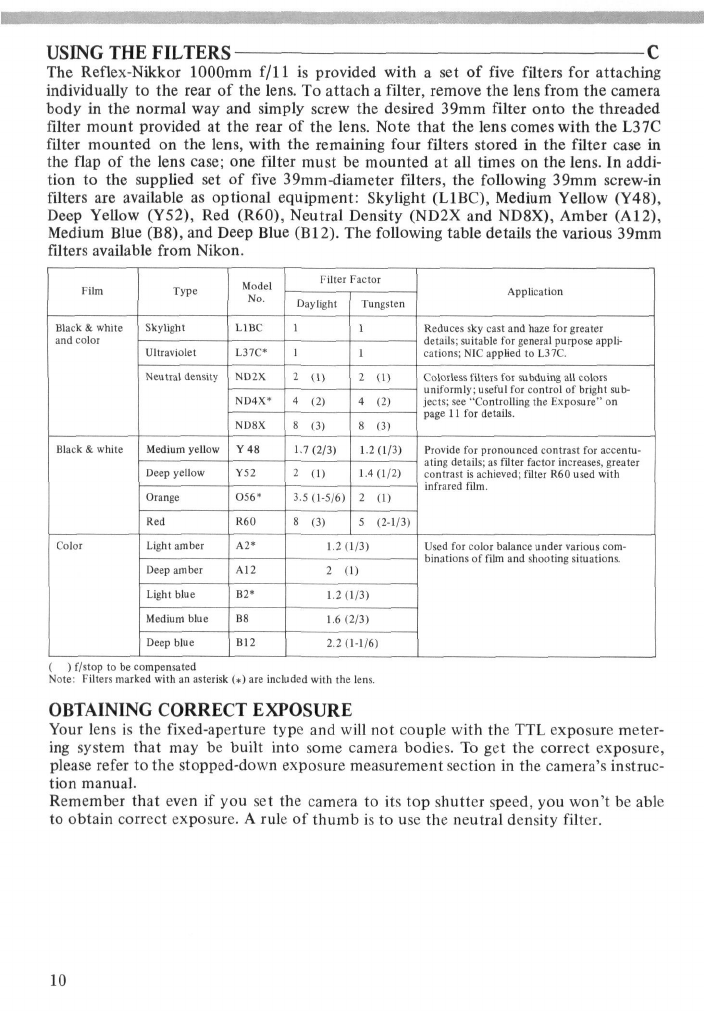
USING
THE
FILTERS
C
The Reflex-Nikkor 1000mm
f/11 is
provided with
a set of
five filters
for
attaching
individually
to the
rear
of the
lens.
To
attach
a
filter, remove
the
lens from
the
camera
body
in the
normal
way and
simply screw
the
desired 39mm filter onto
the
threaded
filter mount provided
at the
rear
of the
lens. Note that
the
lens comes with
the
L37C
filter mounted
on the
lens, with
the
remaining four filters stored
in the
filter case
in
the flap
of the
lens case;
one
filter must
be
mounted
at all
times
on the
lens.
In
addi-
tion
to the
supplied
set of
five 39mm-diameter filters,
the
following 39mm screw-in
filters
are
available
as
optional equipment: Skylight (L1BC), Medium Yellow (Y48),
Deep Yellow (Y52),
Red
(R60), Neutral Density (ND2X
and
ND8X), Amber (A12),
Medium Blue (B8),
and
Deep Blue (B12).
The
following table details
the
various 39mm
filters available from Nikon.
Film
Black
&
white
and color
Black
&
white
Color
Type
Skylight
Ultraviolet
Neutral density
Medium yellow
Deep yellow
Orange
Red
Light amber
Deep amber
Light blue
Medium blue
Deep blue
Model
No.
L1BC
L37C«
ND2X
ND4X»
ND8X
Y48
Y52
056*
R60
A2*
A12
B2«
B8
B12
Filter Factor
Daylight
1
1
2
(1)
4
(2)
8
(3)
1-7(2/3)
2
(1)
3.5
(1-5/6)
8
(3)
Tungsten
1
1
2
(1)
4
(2)
8
(3)
12(1/3)
1.4(1/2)
2
(1)
5 (2-1/3)
1.2(1/3)
2
(1)
1.2(1/3)
1.6 (2/3)
2.2(1-1/6)
Application
Reduces
sky
cast
and
haze
for
greater
details; suitable
for
general purpose appli-
cations;
NIC
appHed
to
L37C.
Colorless filters
for
subduing
all
colors
uniformly; useful
for
control
of
bright sub-
jects;
see
"Controlling
the
Exposure"
on
page
11 for
details.
Provide
for
pronounced contrast
for
accentu-
ating details;
as
filter factor increases, greater
contrast
is
achieved; filter
R60
used with
infrared film.
Used
for
color balance under various com-
binations
of
film
and
shooting situations.
(
)
f/stop
to be
compensated
Note: Filters marked with
an
asterisk
(*) are
included with
the
lens.
OBTAINING CORRECT EXPOSURE
Your lens
is the
fixed-aperture type
and
will
not
couple with
the TTL
exposure meter-
ing system that
may be
built into some camera bodies.
To get the
correct exposure,
please refer
to the
stopped-down exposure measurement section
in the
camera's instruc-
tion manual.
Remember that even
if you set the
camera
to its top
shutter speed,
you
won't
be
able
to obtain correct exposure.
A
rule
of
thumb
is to use the
neutral density filter.
10


















